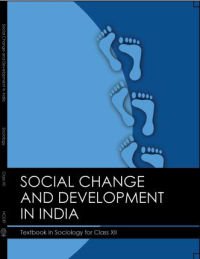Class 12th Sociology Part 2: New syllabus for class 12 CBSE is now available in devlibrary.in you can download/read Class 12th Sociology Part 2 Social Change And Development In India here in one click, The curriculum for exams is designed by CBSE, New Delhi as per NCERT text books.
Class 12th Sociology Part 2
NCERT Class 12th Sociology Part 2 Social Change And Development In India
- Understanding the present usually involves some grasp of its past. This holds true probably as much for an individual or social group as for an entire country such as India. India has a long and rich history. While knowing about its past in ancient and medieval times is very important, its colonial experience is particularly significant for comprehending modern India. This is not just because many modern ideas and institutions reached India through colonialism. It is also because such an exposure to modern ideas was contradictory or paradoxical.
- For example Indians in the colonial period read about western liberalism and freedom. Yet they lived under a western, colonial rule that denied Indians liberty and freedom. It is contradictions of this kind that shaped many of the structural and cultural changes that chapter 1 and 2 looks at.
- As the next few chapters shall show, our social reform and nationalist
movement, our laws, our political life and our Constitution, our industry and agriculture, our cities and our villages have been shaped by our paradoxical experience with colonialism. This has had lasting implications for our specific experience with modernity. The following are just some of the many instances we face in our daily life. - We have a parliamentary and a legal system, a police and educational system built very much on the British model. We drive on the left side of the road like the British. We have ‘bread-omlette’ and ‘cutlets’ as menu offered in many roadside eateries and canteens. A very popular manufacturer of biscuits, is actually named after Britain. Many school uniforms include neck-ties. We often admire the west and as often resent it. These are just some of the many and complex ways that British colonialism lives on in contemporary India.
Class 12th Sociology New Syllabus
Class 12th Sociology Part 1
INDIAN SOCIETY: 32 Marks
Unit 1: Introducing Indian Society: 10 Periods
- Colonialism, Nationalism, Class and Communits
Unit 2: The Demographic Structure of the Indian Society: 10 Periods
- Theories and concepts in demography
- Rural-Urban Linkages and Divisions
Unit 3: Social Institutions: Continuity and Change: 12 Periods
- The Caste System
- Family and Kinship
Unit 4: Market as a Social Institution: 10 Periods
- Sociological perspectives on markets and the economy
- Globalization – Interlinking of Local, Regional, National and International Markets
Unit 5: Patterns of Social Inequality and Exclusion: 20 Periods
- Caste Prejudice, Scheduled Castes and Other Backward Classes
- Marginalization of Tribal Communities
- The Struggle for Women’s Equality
- The struggles of the Differently Abled
Unit 6: The Challenges of Cultural Diversity: 20 Periods
- Cultural communities and the nation state
- Problems of Communalism, Regionalism and Casteism
- The Nation state, religion related issues and identities
- Communalism, secularism and the nation state
- State and Civil Society
Unit 7: Suggestions for Project Work: 16 Periods
Class 12th Sociology Part 2
CHANGE AND DEVELOPMENT IN INDIA: 48 Marks
Unit 8: Structural Change: 10 Periods
- Colonialism, Industrialization, Urbanization
Unit 9: Cultural Change: 12 Periods
- Modernization, Westernization, Sanskritisation, Secularization
- Social Reform Movements and Laws
Unit 10: The Story of Indian Democracy: 16 Periods
- The Constitution as an instrument of Social Change
- Panchayati Raj and the Challenges of Social Transformation
- Parties, Pressure Groups and Democratic Politics
Unit 11: Change and Development in Rural Society: 10 Periods
- Land Reforms, Green Revolution and Emerging Agrarian society
- Agrarian Structure : Caste & class in Rural India
- Land Reforms
- Green revolution and its social consequences
- Transformation in Rural Society
- Globalization, Liberalization and Rural Society
Unit 12: Change and Development in Industrial Society: 14 Periods
- From Planned Industrialization to Liberalization
- Getting a Job
- Work Processes
Unit 13: Globalisation and Social Change: 10 Periods
- Dimensions of Globalization
Unit 14: Mass Media and Communication: 14 Periods
- Types of Mass Media: Radio, Television and Print Media
- Changing Nature of Mass Media
Unit 15: Social Movements: 18 Periods
- Theories and Classification of Social Movements
- Class-Based Movements: Workers, Peasants
- Caste-Based Movements: Dalit Movement, Backward Castes, Trends in Upper Caste Responses
- Women’s Movements in Independent India
- Tribal Movements
- Environmental Movements
You Can Download Here:
Class 12th Sociology Part 2: NCERT Class 12th Sociology Part 2 Social Change And Development In India Book free download from the category of CBSC, If you want to This Book Then Click Download button and wait few seconds. All kinds of NCERT books/Solution, Regional Novel and Other College/University books are available in this website. Browse and read/download your favourite Books… Thank You Reader..

Hi, I’m Dev Kirtonia, Founder & CEO of Dev Library. A website that provides all SCERT, NCERT 3 to 12, and BA, B.com, B.Sc, and Computer Science with Post Graduate Notes & Suggestions, Novel, eBooks, Biography, Quotes, Study Materials, and more.










